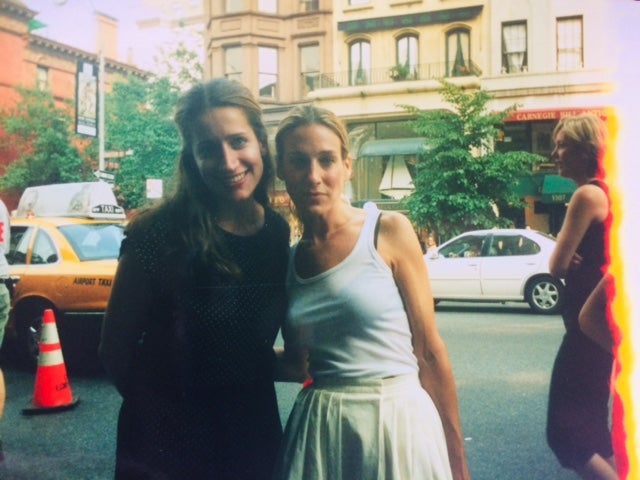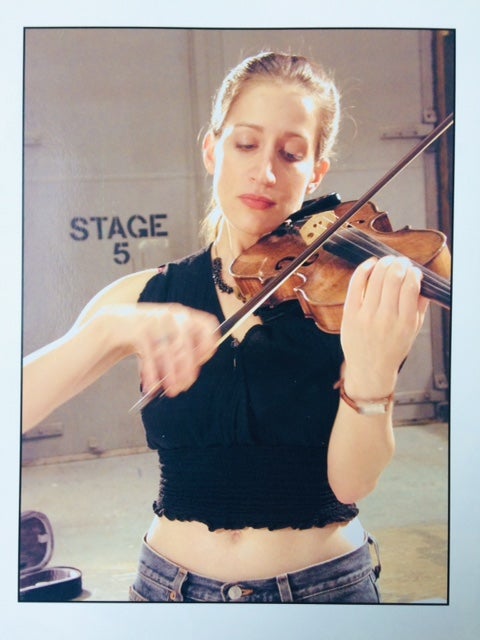I was Charlotte’s stand-in on Sex and the City. Some of the behavior I saw still shocks me
They took Polaroids of me with my feet tied to the bed like it was a big joke. I wanted to flee. But I needed the paycheck. I needed the Screen Actors’ Guild healthcare
Your support helps us to tell the story
From reproductive rights to climate change to Big Tech, The Independent is on the ground when the story is developing. Whether it's investigating the financials of Elon Musk's pro-Trump PAC or producing our latest documentary, 'The A Word', which shines a light on the American women fighting for reproductive rights, we know how important it is to parse out the facts from the messaging.
At such a critical moment in US history, we need reporters on the ground. Your donation allows us to keep sending journalists to speak to both sides of the story.
The Independent is trusted by Americans across the entire political spectrum. And unlike many other quality news outlets, we choose not to lock Americans out of our reporting and analysis with paywalls. We believe quality journalism should be available to everyone, paid for by those who can afford it.
Your support makes all the difference.Before it appeared on our screens, HBO’s Max chief content officer Casey Bloys told TVLine that the Sex and the City reboot And Just Like That… would provide a realistic portrayal of woman in their 50’s. To that end, he explained, “Just as people come into your life, people leave.”
Personally, the memories of working onSex and the City will never leave my mind. I was the stand-in for Kristin Davis, who played Charlotte, for four seasons. A stand-in is someone posed like a mannequin so the cinematographer can set the lights and check for shadows before the actors arrive. With my big, round eyes and long, brown hair, I resembled Kristin Davis enough for the job — and over the years, I also stood in for Amanda Peet, Marlee Matlin, and Rosemarie DeWitt. We were all the same height and similar weight.
One scene stands out for me: Season 4, Episode 2. Charlotte goes to her gynecologist with a yeast-like infection complaint and instead is prescribed an antidepressant and told to keep a vagina journal. She’s horrified. As Charlotte’s stand-in, I had to reenact that scene over and over — and it led to one of the most embarrassing moments of my life. But to understand that, first I have to tell you a little about how I got into “standing in” in the first place.
In 1999, when I was 26 years old, single, and living in a rent-controlled studio apartment on the Upper West Side, I had never heard of such odd jobs. I didn’t own a TV, obviously didn’t have cable, and I didn’t own a computer either. Instead, I jotted down my observations, smoked, and walked in Central Park and around my neighborhood.
One night, at a bar with big windows, a group of 30-somethings wore sparkly dresses and drank out of martini glasses. On the overhead TV, Sarah Jessica Parker smoked on her bed like me. Transfixed, I entered and watched.
In the scene, SJP was on the cover of New York Magazine with a headline that read: “Single and Fabulous?” She was smart, witty, enterprising and curious.
Having grown up in Hell’s Kitchen and been homeschooled by a single mom on welfare, I too had some of those qualities. As a kid, I played my violin in front of Steuben Glass across from Trump Tower to earn money for my family and dreamed of performing at Lincoln Center.

But I was on my own, and making ends meet as a waitress. Like a lot of young woman in the service industry, my manager would often slide his hand over my butt as I loaded the bread baskets at brunch. I wanted to quit, but I needed a job.
“You look like Charlotte on Sex and the City!” my fellow waiter said to me; he worked as an actor too. “Maybe you’ll get your big break if you become her stand-in.”
I jumped at the suggestion and began showing up at the casting director’s office week after week, begging for him to give me a chance. He finally did.
At Silvercup Studios in Queens, as the crew set up the lights, I read the sides (about five pages of script) and did as told by the assistant director. I laid down on the gynecologist’s table, spread my legs into the stirrups, and did my best to relax.
The star, director, writers, and producers left for a meeting. An hour later or so, I was still lying there, wanting to be dismissed and let Kristin Davis film her part. I had worked about 60 hours that week. My eyes began to close. I fell into a deep sleep.
When I awoke, I found my feet had been duct-taped to the stirrups. Crew members laughed. I felt sick. They took Polaroids of me like it was a big joke. I wanted to flee. But I needed the paycheck. I needed the Screen Actors’ Guild healthcare.
I stayed and remained silent on the set. I began avoiding the catered lunch upstairs at Silvercup Studios. Instead I brought my violin, practiced on an empty lot, and lost 15 pounds. For years, I stood in for the stars. I never stood up for myself.

Until the day arrived. An alpha male actor pointed to my fellow co-worker — the stand-in for Miranda — and declared for all to hear, “I wantthat one tied up, gagged, and brought to my trailer.”
I was disgusted. I don’t think he even had a trailer. The next time that male actor got too close to me, I said, “This is my space. It’s my job to stand here. Back up.”
It wasn’t the most powerful speech I’d ever made, but after that he stopped bothering us.
One day, the casting director asked me, “Can you play your violin and assemble a string quartet? It’s one of the last scenes with Mikhail Baryshnikov and Sarah Jessica Parker.”
“Abso-fucking-lutely,” I responded like Mr Big.
It was a night shoot across from the Metropolitan Opera House at Lincoln Center. Sarah Jessica Parker wore a dark pink Oscar de la Renta dress and Baryshnikov a tux. In the scene, SJP and Baryshnikov dashed past me as my quartet and I played Aleksandr Borodin’s String Quartet Number Two in D: II, Scherzo.

Hours later, we wrapped before sunrise. I walked back home to 72nd Street. I passed the bar where I had seen my first episode, and marveled that my childhood dream of performing at Lincoln Center had finally come true.
Years later, I became a professional writer like Carrie Bradshaw and have mommy friends who can’t wait to party when this pandemic is over. Not like Carrie, I’m a wife, mother, and mentor at Girls Write Now, a non-profit that matches women writers with teen girls. I’m the person today I so needed in my past.
I learned a lot working, watching, and acting out scenes on Sex and the City. Like sometimes you want a pair of Manolo’s more than a man, the best nights are with girlfriends drinking cosmos in the city, and Carrie’s Marlboros were the only thing that mirrored reality. Most of all, I learnt how messy the industry could be. And even though it came a lot later, my experiences on the show taught me how to stand up for sisterhood, my co-worker, and most importantly for myself.
This is an updated version of an article originally published in February 2021

Join our commenting forum
Join thought-provoking conversations, follow other Independent readers and see their replies
Comments